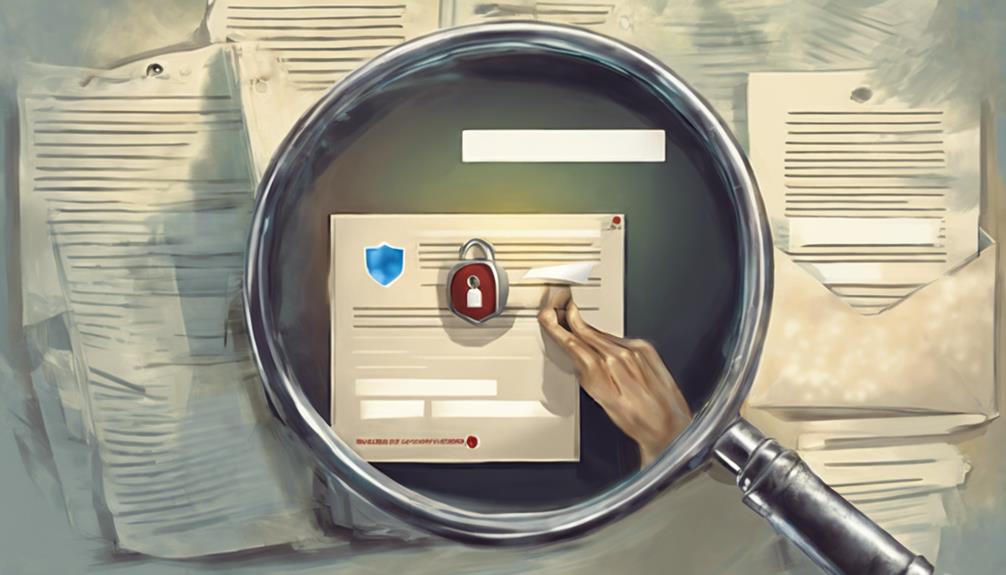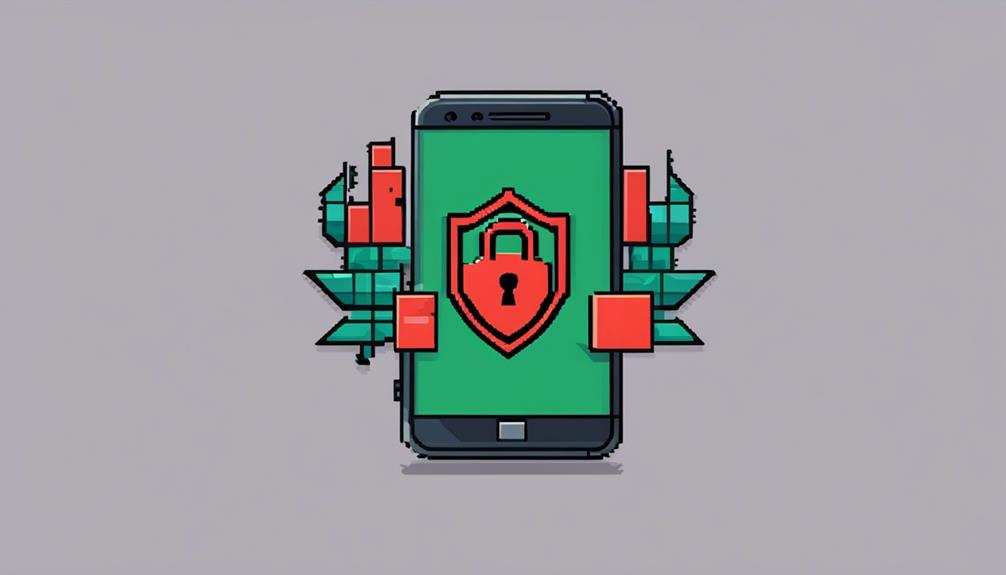Safeguard your data from hackers by updating devices, using antivirus software, and strong passwords. Employ firewalls and two-factor authentication for added security. Verify emails, avoid phishing, and limit sensitive information shared online. Be cautious with social media details and adjust privacy settings. Stay vigilant, update security software, and educate yourself on common cyber threats. This multifaceted approach guarantees thorough protection against potential breaches.
Key Takeaways
- Update devices and software regularly to prevent vulnerabilities.
- Utilize strong, unique passwords and two-factor authentication.
- Exercise caution with emails, downloads, and sharing sensitive information.
- Be mindful of social media privacy settings and information sharing.
- Stay informed on cybersecurity threats and best practices.
Strengthening Device Security Measures
To enhance data protection and safeguard against cyber threats, strengthening device security measures is essential. This includes regularly updating all devices and software to patch security vulnerabilities and protect against potential hacks.
Utilizing antivirus software, antispyware, and firewalls can prevent unauthorized access and malicious attacks on your devices. Installing system, browser, and app updates guarantees the latest security features are in place for enhanced protection. Enabling firewalls can block unauthorized communications, further enhancing the security of your devices against external threats.
Additionally, implementing strong passwords and authentication methods is vital to securing your data and preventing unauthorized access by hackers. By prioritizing device security through software updates, firewalls, antivirus programs, and robust authentication measures, individuals and organizations can significantly reduce the risk of falling victim to malicious cyber activities such as unauthorized access and malicious attacks.
Implementing Complex Passwords and Authentication

Strengthening device security measures through regular updates and the use of protective software lays a foundation for implementing complex passwords and authentication to bolster data protection against potential cyber threats.
Creating unique and complex passwords for each account is essential in enhancing security. By incorporating a mix of characters, numbers, and symbols, users can greatly reduce the risk of unauthorized access. Utilizing password managers such as LastPass or KeePass can aid in generating and securely storing these strong passwords.
Additionally, implementing two-factor authentication adds an extra layer of protection by requiring a secondary form of verification. It is imperative to avoid using easily guessable information like birthdays or names in passwords to thwart hacking attempts.
Regularly updating and changing passwords is also vital to minimize the likelihood of unauthorized access to sensitive data. By focusing on robust authentication methods and password practices, individuals can fortify their defenses against potential cyber threats.
Avoiding Phishing Attacks and Verifying Sources

Enhancing vigilance and verifying sources are vital strategies for safeguarding against phishing attacks and potential data breaches. Phishing attacks often involve deceptive emails or messages that aim to trick individuals into divulging personal information or clicking on malicious links.
To avoid falling victim to such scams, it is essential to verify the authenticity of emails or messages before providing any confidential details. Phishers frequently create urgent scenarios to prompt immediate actions, such as clicking on links or responding to suspicious requests, so exercising caution is paramount.
Scammers leverage phishing attacks to extract sensitive information, emphasizing the importance of being vigilant and validating sources before taking any actions that could compromise data security.
Additionally, downloading files only from trusted sources can help minimize the risk of falling prey to phishing schemes and protect valuable information from potential breaches. Stay alert and verify sources to stay one step ahead of cybercriminals seeking unauthorized access to confidential data.
Limiting Information Shared on Social Media

Securing personal data online involves implementing measures to limit the information shared on social media platforms. When using social media, it is important to be cautious about the personal information you disclose, as hackers can exploit this data for targeted attacks. Avoid sharing sensitive details like your full name, address, phone number, and birthdate publicly. Refrain from posting real-time vacation plans or location updates to prevent potential burglaries or unauthorized access to your home. Adjust your privacy settings on social media accounts to manage who can view your posts, photos, and personal information. Regularly reviewing and updating these privacy controls is essential to make sure that only trusted individuals have access to your data on social media.
| Social Media Risks | Protective Measures |
|---|---|
| Targeted Attacks | Limit Sensitive Information |
| Unauthorized Access | Avoid Real-time Updates |
| Privacy Settings | Control Information Sharing |
Staying Vigilant and Following Best Practices

Remaining vigilant and adhering to best practices are vital components in safeguarding your data from potential cyber threats. To protect your data, it is essential to regularly update security software and operating systems to address vulnerabilities that hackers may exploit.
Utilizing strong, unique passwords for each account and enabling two-factor authentication adds an extra layer of security, making it harder for unauthorized access. Awareness of phishing emails is paramount; refrain from interacting with suspicious links or sharing personal information with unfamiliar sources to prevent falling victim to cyber-attacks.
Furthermore, exercise caution when connecting to public Wi-Fi networks to avoid potential data interception by hackers lurking on unsecured channels. Educating oneself on common hacking techniques and staying informed about the latest cybersecurity threats are proactive measures that contribute to enhancing data security.
Frequently Asked Questions
How Are You Going to Protect Your Data From Hackers?
To safeguard sensitive information and maintain data integrity, a thorough approach is essential. Implementing security measures like software updates, strong passwords, two-factor authentication, and vigilance against phishing attacks are vital steps to enhance data protection.
What Are 5 Ways You Can Avoid Being Hacked?
To avoid being hacked, safeguard your digital security by utilizing unique passwords, enabling two-factor authentication, updating devices regularly, staying vigilant against phishing attempts, and refraining from connecting to unsecured public Wi-Fi networks. These proactive measures fortify your defenses against cyber threats.
How Can You Keep Data Secure?
Ensuring data security involves implementing robust measures such as using strong passwords, enabling two-factor authentication, updating devices regularly, avoiding suspicious links, and employing reputable antivirus software. These practices help safeguard sensitive information from potential threats.
What Are 3 Ways You Can Ensure Your Safety if You Get Hacked?
In the event of a hacking incident, swiftly change passwords, monitor financial accounts, and consider two-factor authentication. These actions can help contain the breach, limit damage, and enhance security measures against future cyber threats.
Conclusion
To sum up, safeguarding your data from hackers requires a multi-faceted approach that includes strengthening device security, using complex passwords, avoiding phishing attacks, limiting information shared on social media, and staying vigilant.
By following best practices and being proactive in protecting your personal information, you can reduce the risk of falling victim to cyber threats.
For example, in a recent case study, a company's data was compromised due to a phishing attack, highlighting the importance of educating employees on cybersecurity measures.









